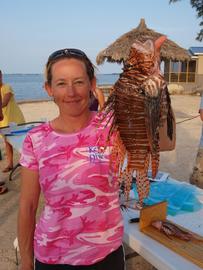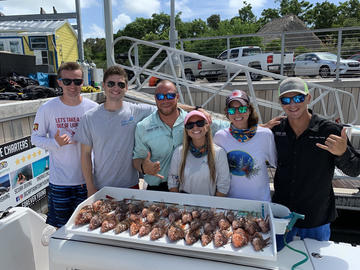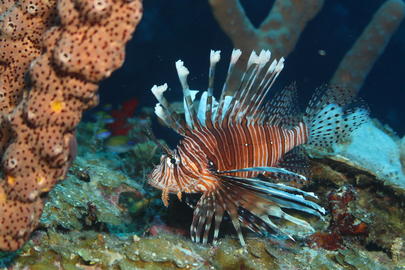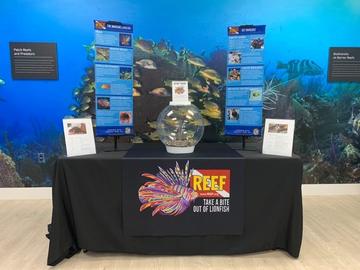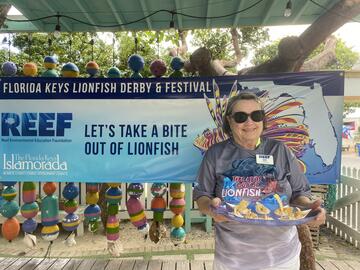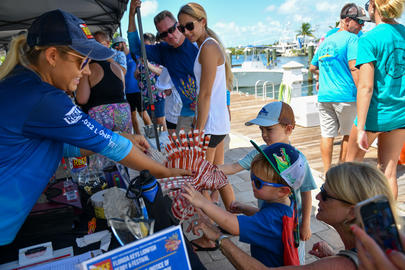Divers and snorkelers removed 1,518 invasive lionfish from Florida Keys waters during three Lionfish Derby events in 2011. Organized by REEF in partnership with the Florida Keys National Marine Sanctuary, the Florida Keys Lionfish Derby series began in 2010 to engage local communities in addressing the invasive lionfish issue.
Current search
Search found 418 items
- INVASIVE
Invasive lionfish in the western Atlantic are known to be voracious predators. Their unusual hunting behavior suggests that they could prey on most fish species within their gape size limits. Significant research by REEF researchers and others has been conducted looking at stomach contents of lionfish to identify prey. However, relatively few prey species have been identified because of the challenge of identifying partly digested prey. It is also difficult to know how well the identifiable diet reflects the unidentified portion.
Managing invasive Indo-Pacific lionfish (Pterois volitans and P. miles) in the Western Atlantic Ocean is beyond the capacity of natural resource organizations alone. In response, organizations have mobilized members of the public and citizen scientists to help. The authors used a structured survey to assess the activities and perceptions of 71 organizations that engage the public and citizen scientists in lionfish research and management throughout the invaded range of the Western Atlantic.
For the first three weeks in July, REEF’s Invasive Species Program Manager, Dr. Alli Candelmo, and Lead Intern for the Invasive Species Program, Madalyn “Moose” Mussey, have spent almost every day underwater conducting lionfish research. With the help of Forever Young Charter Company, Tony Young, Jeff Leonia, REEF staff, and volunteers, REEF has been assessing lionfish densities in deep water habitats off Islamorada, FL. Along with habitat surveys, the team has deployed a hydrophone (which records underwater sounds including fish sounds) in a site with high densities of lionfish.
Culling can be an effective management tool for reducing populations of invasive species to levels that minimize ecological effects. However, culling is labour-intensive, costly, and may have unintended ecological consequences. In the Caribbean, culling is widely used to control invasive Indo-Pacific lionfish, Pterois volitans and P. miles, but the effectiveness of infrequent culling in terms of reducing lionfish abundance and halting native prey decline is unclear.
Designing effective local management for invasive species poses a major challenge for conservation, yet factors affecting intervention success and efficiency are rarely evaluated and incorporated into practice. As part of a multi-year study with funding from NOAA Coral Reef Conservation Program and others, REEF and partners coordinated regional efforts by divers to cull invasive lionfish (Pterois spp.) on 33 U.S. Atlantic, Gulf of Mexico, and Caribbean protected coral reefs from 2013 to 2019.
We are excited to share a new scientific paper that was published in the journal Global Change Biology last month. Researchers used REEF’s Volunteer Fish Survey Project database to answer crucial questions about the impacts of invasive lionfish as their range expands into new areas, such as Brazil. It is well known that predation by lionfish affects native fish populations, and this impact is likely exacerbated in certain vulnerable species.
Despite a summer with very little Lionfish Derby action, our Invasive Species Program has been keeping busy with plenty of projects, including several grants that we have recently been awarded to support our ongoing lionfish work. First, we're excited to share that REEF has been awarded $299,087 through NOAA's Saltonstall-Kennedy Competitive Grants Program, to study the effectiveness of lionfish traps on deep reefs in the Florida Keys.
Last month, 14 teams of scuba divers took to the water and collected 1,527 invasive lionfish during the 15th annual REEF Florida Keys Lionfish Derby & Festival. Teams fished from sunrise to sunset on Friday, Aug. 16 and Saturday, Aug. 17. On Saturday evening, derby participants and the public gathered at Florida Keys Brewing Company for Invaders on Tap, a lionfish awareness celebration and social with live music, educational activities and games, and lionfish tastings. The weekend concluded on Sunday, Aug.
Eighteen teams of scuba divers took to the water and collected 919 invasive lionfish during the 2022 REEF Florida Keys Lionfish Derby & Festival. Teams fished from sunrise to sunset on Friday, Sept. 9 and Saturday, Sept. 10. The event concluded on Sunday, Sept. 11 at Postcard Inn Resort & Marina in Islamorada, with an outdoor festival featuring lionfish tastings, cooking and dissection demos, games, interactive booths, and live music. More than 400 people attended the event, along with over 20 partner organizations who hosted booths.

